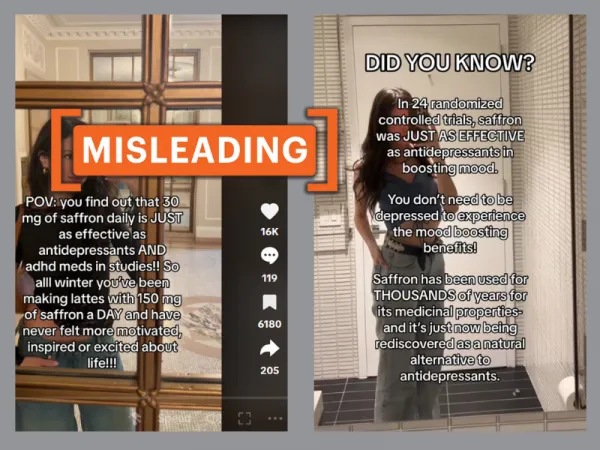By: Siri Christiansen
February 20 2024
 TikTok videos that claim saffron is as effective as antidepressants and ADHD medications. Screenshot by Logically Facts.
TikTok videos that claim saffron is as effective as antidepressants and ADHD medications. Screenshot by Logically Facts.
The existing clinical trials have been small, short, and largely conducted in Iran, a major saffron exporter.
The claim
A viral video circulating on TikTok claims that 30 milligrams of saffron is as effective as antidepressants and ADHD medication.
The video was uploaded by a wellness influencer who claims that she has been making lattes with 150mg of saffron daily and that this has made her more motivated, inspired, and excited about life. The video was published on February 8 and has since gained over 213,000 views and 16,000 likes.
The same influencer has made previous videos on the topic, and she’s not the first to make the claim. A TikTok search for “saffron” and “antidepressant” or “ADHD” yields several videos arguing that saffron has been scientifically proven to be an effective treatment against depression and ADHD, with some stating it is as effective as the SSRIs Fluoxetine and Citalopram, as well as the ADHD medications Ritalin and Adderall. Many of the videos have racked up hundreds of thousands of views.
Source: TikTok/Screenshots (Modified by Logically Facts)
Archived videos can be found here, here, here, here, and here.
The facts
“There is not enough data or information to conclude what effect saffron has compared to medicines treating depression and ADHD,” Malin Söderberg, who heads the group for the efficiency and safety of plant-based medicine at the Swedish Medical Products Agency, told Logically Facts.
Since there are currently no approved medicines based on saffron, the Swedish Medical Products Agency has not investigated saffron, its safety profile, or its possible effects. In 2023, the McGill Office for Science and Society found that the existing clinical trials examining the use of saffron for depression have been very small and short-term, lasting no longer than two months.
In one 2004 study, a daily saffron dose of 30 milligrams was found to have a similar effect as a tricyclic antidepressant. However, the study only included two groups of 15 patients and lasted just six weeks. A 2019 systematic review on the effect of saffron on depression and anxiety also warned of a publication bias and lack of diversity, as 21 of the 23 studies examined had been conducted in Iran, one of the world’s major saffron producers, and 13 were performed by the same research group.
Similarly, other science-based health websites, including WebMD and Medical News Today, conclude that the current research is not enough to prove saffron helps with depression or ADHD.
“Among the problems are [the number of] patients that have been included in the studies, how well the saffron product and the placebo are described, whether the effects are evaluated by a physician or the patient, and the short time during which the intervention has been studied. Most studies are also performed in very limited and similar populations,” Söderberg said.
She said that to be considered reliable the studies would need to include larger numbers of patients at several international sites and clinics, evaluate clinically relevant effects, use saffron formulations and products that are quality controlled and sufficiently described, and follow the treatment over longer time periods.
The verdict
There are some small, short-term studies that suggest saffron is effective for treating symptoms of ADHD and depression, but large-scale, long-term studies are needed. SSRIs and ADHD medication, on the other hand, have been proven effective in large-scale, long-term studies. To claim that saffron is as effective as antidepressants and ADHD medication is, therefore, misleading.